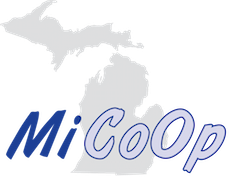
Supporting Growth for All
Portland Public Schools (PPS) is a PreK-13 district located northwest of Lansing in the Ionia County ISD. The mission of Portland Public Schools, in partnership with the community, is to provide a safe learning experience so each student feels empowered to meet their full potential. Throughout the district, relationships, data, and a variety of options and opportunities are part of a personalized learning experience for all students and staff.
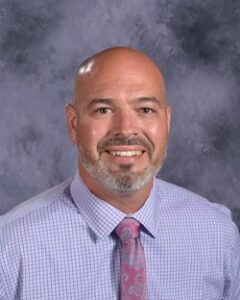
Superintendent Will Heath PC: PPS
The district has two elementary schools, one middle school, one high school, an alternative school, a virtual school, and an adult education program. From developmental kindergarten through early college, the district is steadily increasing opportunities for the over 2,000 students enrolled. According to mischooldata.org, 93%of the students are white non-Hispanic and 33% are economically disadvantaged. Less than 10% of students have disabilities and less than 5% are English Language Learners.
Will Heath has been the Superintendent of Portland Public Schools since 2017. After obtaining his bachelor’s degree from Michigan State University, he taught science for five years at Owosso High School. During that time he earned his master’s degree from Grand Valley State University. Will spent six years at Morrice Area Schools as the Jr/Sr High Principal and Superintendent. In the 16 years he served in the U.S. Navy (five years on active duty and 11 years as a reservist), he developed multiple leadership strategies that have served him well as an administrator, such as his systems orientation to solving problems and decision making. Through his leadership, the district works seamlessly together to provide systems of support for all stakeholders.
District Culture
The message Superintendent Heath shares with the stakeholders of Portland Public Schools is that they are a district of supports. He encourages students, teachers, administrators, and the community to come together to provide the best learning experience possible for all. That includes asking for help, in any role, so the assistance that is needed is what is received. As the district encounters problems, he encourages meeting in the middle to find viable solutions for all. Support for students occurs in many forms but begins with a solid positive culture. Creating this culture for students is ongoing at all levels. While the elementary school focuses on building a culture to love learning, the middle school and high school are intentional about providing a smooth transition from 5th to 6th grade and 8th to 9th grade, respectively. The relationships and community students build in their first year of middle and high school carry on through their remaining years.
The decisions that we make as a district are always made with a focus on what is in the best interest of our students, families, and community.
One way the school building staff are creating a positive culture is a staggered start to the school year. The “first” day of school is a half-day for students who are entering a grade that is the first in the building. This would be developmental kindergarten and kindergarten at Oakwood Elementary, third grade at Westwood Elementary, sixth grade at the middle school, and ninth grade at the high school. This half-day allows these students to get comfortable with their schedule, teachers, and classmates without the distraction of everyone else in the building.
Staff is supported through instructional coaching, professional development, and professional learning communities (PLCs). The Director of Elementary Education and Director of Secondary Education provide instructional coaching as well as curriculum guidance and leadership. An ISD instructional coach is also used at the elementary level to assist with onboarding new teachers. This coach provides an overview of Portland’s literacy and math instructional tools, shares instructional practices and classroom management strategies, connects their work to Capturing Kids’ Hearts® (discussed further below), and works alongside teachers throughout the year on issues the teachers need or want to address. Teachers have choices for their learning during professional development days, including the option to lead training for other teachers. PLCs often arise from conversations that begin with curriculum and lead to deeper conversations on student data (i.e., What is this telling us about their learning?), student well-being (i.e., How is this impacting student learning?), standards-based grading (i.e., How are we developing a growth mindset?), or other topics that focus on a learner-centered environment.
To support teachers in addressing lags in reading skills, the district intentionally created STEM Labs at Oakwood and Westwood Elementary Schools. The purpose behind the labs is to provide high-quality STEM lessons to all DK-5 students, enhance the elementary science and math curriculums, and give classroom teachers additional instructional planning time and personalized professional learning opportunities to move the district’s initiatives forward.
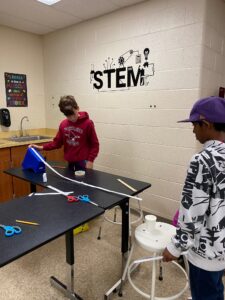
Longest Paper Track Project -Photo Credit: Kim Harding
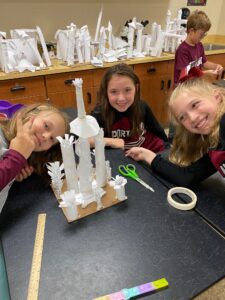
Castle Design and Construction PC: Kim Harding
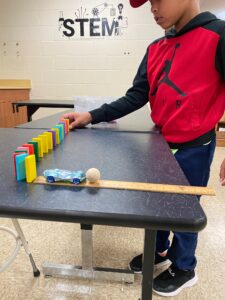
Domino Derby STEM Project PC: Kim Harding
Each elementary building hired a STEM teacher who plans and teaches project-based lessons using the engineering design process. The two teachers have a common planning time in which to develop their curriculum together and also meet with the middle school STEM teacher on scope and sequence. Students learn to think outside the box as they upcycle items to make bird feeders, create stop motion videos, design trash collectors, and much more. They are also afforded the time to go through the engineering design process multiple times on the same project to learn that failure is part of learning and that perseverance pays off. Classroom teachers share that when students return to the classroom, they are excited and eager to share what they are doing and learning, displaying a love for science (a goal of the labs).
While students attend STEM class once a week, their classroom teacher has additional time to meet with an instructional coach, observe other teachers’ teaching, look at their student data, and plan for additional support that students need. The instructional coaches work closely with each teacher to brainstorm, select, and implement strategies. They co-teach, model, and observe, and help the teacher reflect on their learning. Just like the STEM teachers allow their students the time to work through the process of learning, the instructional coaches allow teachers time to make deep and meaningful changes in their teaching practices so that student engagement and learning improve.
One way parents are supported is through a guaranteed and viable curriculum. The district is working on a parent portal that will contain curriculum for each grade level at the elementary level and each course at the middle and high school levels. Once complete, it will function similarly to a course catalog where parents can choose a grade or course and view the curriculum their child is learning.
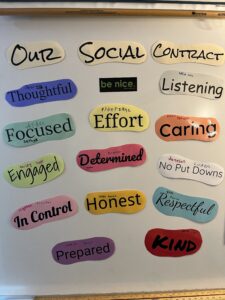
Social Contract PC: PPS
Intentionally focusing on social-emotional wellbeing is another element to creating a positive culture in the district. In 2021-22, PPS launched Capturing Kids’ Hearts® (CKH). CKH equips professionals in K-12 education to implement transformational processes focused on social-emotional wellbeing, relationship-driven campus culture, and student connectedness. All district leadership roles (e.g., superintendent, principals, bus drivers, cafeteria employees, etc.) went through CKH Leadership Blueprint training where they learned specific communication skills to build relationships, trust, and respect. Pre-K through 8th-grade staff learned how to build meaningful relationships with students and colleagues to create self-managing classrooms that lead to a safe and effective learning environment. The high school will receive this training in 2022-23.
Oakwood Elementary Principal Becky Manika shared, “Because of Capturing Kids’ Hearts, our staff started looking at the students as ‘our’ kids instead of ‘my’ kids.” This mindshift from classroom to building focus has created more opportunities for students to develop additional relationships and feel more connected. At Westwood Elementary, Principal Chris Kenroy attributes the increased attendance, in part, to adopting CKH into Tier 1 of the schools’ support system. Chris leads staff meetings with CKH, classrooms share “good things” every morning, Friday is affirmation day, and students assist with daily announcements. There has been positive feedback about this intentional focus on the social-emotional needs of staff and students and how it has impacted the culture in the schools. Middle School Math Teacher Alyssa Stemler appreciates how the student-centeredness of Capturing Kids Hearts aligns with other student-centered learning practices she is implementing in her classroom.
School psychologists, counselors, and social workers help students who need more support beyond CKH. The district also maintains a Mental Health Resources web page. Resources for elementary, middle, and high school students, parents, and teachers are available. An addition since COVID are five district-owned, certified facility (i.e., therapy) dogs that will begin servicing students in 2023. The animals live with their school handlers who also go through the training with them. The dogs will serve PPS students in a variety of ways including academic as well as social/emotional needs.
Systems are necessary for any organization to realize their vision. At Portland, Superintendent Heath has clearly shared the vision and direction for the district. In addition, a District Leadership Team understands where they are headed and has developed systems to get them there. To support these systems, positions have been created to lead staff through the processes and procedures to realize this vision.

The backbone for all learning at PPS is their Multi-Tiered System of Support (MTSS). Portland has been intentional in designing, executing, and monitoring this system. Their MTSS is guided by evidence of learning (i.e., data) with the goal that all students in the district will continue to grow in their learning. PPS has defined district-wide expectations for behavior (PRIDE) and achievement, established a coaching system to ensure consistent fidelity of district-wide MTSS implementation, always uses student achievement and capacity data to drive the problem-solving cycle, and has implemented district-wide programs to collect behavior and achievement data. As each building maintains this system, student engagement and achievement have increased across the district.
Standards-Based Grading
The pandemic was also a catalyst for teachers and students to look at teaching and learning in a new way. Teachers looked at and rewrote content to combine material, and had deep conversations about scope, sequence, and basic skills. While some in the district have been using standards-based grading for years, the topic was discussed more widely among staff and more teachers are moving toward this method of grading.
Standards-based grading (SBG) provides a more accurate measurement of student learning and instills a growth mindset. Rather than assigning letter grades that represent a percentage, students are evaluated on their progress to mastering the content which is broken into learning targets. Teachers track student progress on the learning targets, give appropriate feedback, adapt instruction to meet student needs, and allow students to revisit standards until mastered. (Old and new standards below are part of one assessment.)


Students know what they have mastered and what they need to continue working on because a consistent scale is used throughout the district (see below). They have multiple chances to learn the standards and can demonstrate their knowledge through evidence (e.g., a song, 3D object, etc.) not just a test. Through this practice, they understand that learning is a process, not a final score.
Standards-Based Grading Scale:
E: Clearly and accurately shows mastery with no errors in reasoning or conclusions
M: Shows mastery but may have made slight errors in reasoning or conclusions
P: Shows some progress but makes errors in reasoning and/or conclusions
N: Not ready yet
Westwood Elementary, Principal Chris Kenroy shared, “This method of ‘grading’ has helped teachers develop quality classroom instruction as they closely examine their objectives, content, and assessments.” Alyssa Stemler, middle school math teacher agrees. She said her assessments are better with SBG because she has to think through the standards when creating them. SBG also improves communication with parents about what their child knows. Rather than a letter grade that represents an accumulation of many factors, they can see specific areas where their child has mastered the content and where they are still learning it.
Technology
Since 2019, PPS has been a 1:1 Chromebook district. Every elementary classroom has a cart with touch screen Chromebooks that students use during the day. Middle and high school students check out Chromebooks to use at school and at home which they keep throughout the year. These personal devices allow the students at Portland to access content, communicate with teachers, and demonstrate their learning. One way in which they do this is through the learning management system (LMS), Brightspace. The district had been researching learning management systems pre-COVID, but like many things during the pandemic, the decision to adopt one was sped up. Post-COVID, some teachers continue to run their entire course through Brightspace by uploading content, assignments, and assessments, and providing meaningful feedback right on the documents. Grades transfer from Brightspace into Skyward, the district’s student information system, to reduce double-entry for teachers.
Using technology tools often requires a host of usernames and passwords. To reduce the disruption this can cause, PPS uses Clever, a single sign-on program. Elementary students can scan a QR code on their badge to log into their devices. The district also uses Clever to log into Xello (a career exploration program), Amplify (for middle school science and K-5 reading), and TCI (for middle school social studies). They are also in the process of setting it up for NWEA assessments.
To support their technology needs, the district uses a team approach. Instead of having a traditional technology director, the district made the conscious decision to share that responsibility between the superintendent, Will Heath, and the Director of Finance, Derrick Stair. This decision has allowed the district to hire a full-time technology coach, Justin Knull, who works directly with staff on how to effectively implement technology in the classroom and other work spaces. Justin said of his role, “I’ll often say, “Let’s find a meaningful tie to use this technology in your content,” when a teacher wants to use a new app, program, or tool.” In one fifth-grade class, Justin teaches students how to use the 3D printer to create a boat while the classroom teacher focuses on the content that goes along with the project. Through this co-teaching model, teachers can focus on student learning and not get bogged down by trying to learn the technology.
The following sections highlight how Portland Public Schools is personalize learning for all their students within each building.
Elementary Schools
Oakwood Elementary School is an early education building serving students pre-kindergarten through second grade. Beginning with the littlest, the school services children as young as three years old in their Little Raiders Preschool program. Students grow academically, socially, emotionally, and creatively through intentional play-based activities inside and outside the building. The preschool curriculum aligns with Portland’s developmental kindergarten and kindergarten programs, and having all programs in the same building allows for an easy transition to the next level of learning. Parents see the growth in their children and praise the teachers and staff for this growth as well as how they communicate with the parents.
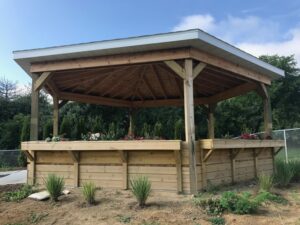
Oakwood Outdoor Classroom PC: PPS
Portland’s developmental kindergarten program focuses on social emotional learning and uses small groups as they learn how to do school. In 2021-22, Oakwood started a “tweener” room for students who need more than the preschool program but are not quite ready for developmental kindergarten. In the developmental kindergarten (DK) classroom, teachers and staff work with 18 students individually and in small groups of three or four. Through the DK program, Portland is truly looking at each student individually and allowing them to grow at their own pace.
Over the past few years, Oakwood has had some intentional changes. As mentioned above, the addition of STEM Labs has allowed their teachers time to meet, discuss student data, and plan interventions that meet each child’s needs. Capturing Kids Hearts has inspired them to focus on students’ social-emotional well-being developed through relationships. School-wide, a change was made to intentionally include small group learning for reading and math. Training these young students to think about reading and math was a mind shift for the staff, but one that has proven effective.
In 2018, the Oakwood Outdoor Classroom was built, proving that learning can take place anywhere. In memory of Vicki Lawless, a former secretary for Oakwood and Westwood Elementary schools, the outdoor classroom allows students to experience nature and learn on their own through play, with the support of teachers when needed. Students gain gross and fine motor skills, develop socially and emotionally, and express their creativity through activities such as gardening, art, climbing, building, music, and more. Many activities connect to the K-2 curriculum.
Learning continues beyond the school day and year through the district’s Latchkey After-School program and Summer Adventure Camp which are held at Oakwood Elementary School. These programs are open to three-year-olds through fifth grade students.
Chris Kenroy, Westwood Elementary School Principal, boasts that their school offers rigorous academics in a place where kids can be kids. Westwood Elementary is a grades 3-5 building with four to five classes at each grade level. The remodeled media center/library is used for group work and discussions, expanding their learning space. Teacher retention in the school is high. While they work hard to provide personalized learning for students, they find value and enjoyment in their work as well.
Because of the way we approach kids and the changes we’ve made this year, students want to come to school and are excited about learning. ~ Chris Kenroy, Westwood Elementary School Principal
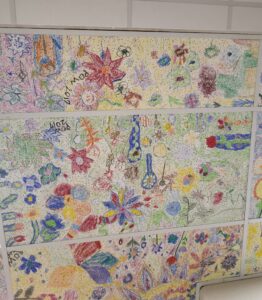
Peers of Westwood Year-End Ceiling Tile Group Activity
With the focus on social-emotional learning (SEL), the school has moved away from daily homework and instead encourages SEL at home. In lieu of homework, teachers now suggest family time activities such as setting the table, playing board games, or walking the dog. Social activities were extended during Spring Break when students could earn Raider Bucks for not using a tech device and spending that time doing something with others. The Raider Bucks store in itself is a positive motivator for the students who run it.
For students who need more SEL support, a Behavior Coach is on staff. This coach works with students through a variety of groups. The 20+ students who are assigned to the Behavior Coach have the benefit of being super connected to an adult that meets with and checks in on them regularly throughout the day. Students needing additional support may receive individual or small group counseling, and some may have a check-in/check-out system for their classes. Teachers and staff meet monthly to discuss student growth and determine if additional support is needed.
Students also provide social-emotional support in the building through Peers of Westwood (POW). Multiple students each year receive autism training and are then paired with a 3rd-5th grader who is on the spectrum. Along with an aide, they spend time together during lunch, recess, and gym class. The peer also assists with technology when needed. Once a month, the peers participate in a school-wide peer-to-peer activity. The POW program not only provides a friend or buddy for the autistic child, it is a growth opportunity for the peer mentor.
Middle School
Social-emotional learning (SEL) is also a focus at Portland Middle School (PMS), and according to Principal Leanna Davis, “it is what makes learning possible.” In fall 2022, all staff received SEL training by Capturing Kids Hearts, leading to consistent classroom expectations, consistent responses to behavior, and a common language that will foster and support student relationship building. PMS has many existing or emerging opportunities for students to learn more about themselves and others as well as gain skills that will benefit them in the future.
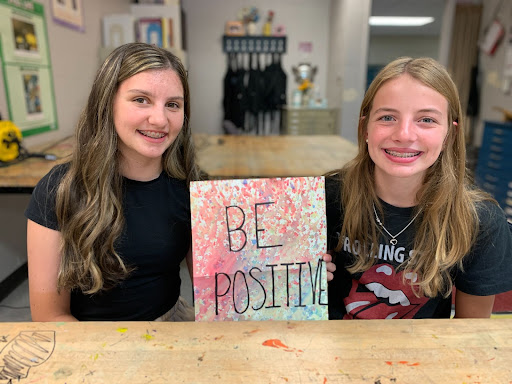
PC: PPS
The middle school partners with The Right Door, a community behavioral health care provider, to run a variety of SEL groups that meet the needs of their students. Four SEL groups meet each week. The Executive Functioning Group helps students work on their accountability and organization skills while the Leadership Group focuses on maximizing their executive functioning skills to be a leader. The Craft Coping Skills group meets during lunch, as do the students in the Homework Club. New SEL groups are created as student needs change.
Beginning in 2022-23, PMS 6th-graders will have a unique structured schedule to support their transition from elementary school. The schedule is intentionally focused on building relationships with kids. Sixth-grade students will begin every day in their homeroom class and return to the same teacher to check-out at the end of the day. Their core teachers will remain the same all year long, and all students will have physical education (PE), an elective, and a 30-minute enrichment class every day. Consistent policies help students with the transition to middle school and include organization, homeroom, communication, cell phone use, homework, and late work. Core and non-core teachers have a common planning time to collaborate and reflect on current practices and outcomes, look at student data and make plans to help students progress in their learning, and plan team building/bonding activities.
Seventh-grade student leadership teams are assigned to 6th-grade homerooms. Three to four TEAM (Teens Empowering and Mentoring) Leaders mentor students in each homeroom throughout the year. In addition to general support like locker issues and organization, the TEAM Leaders teach a lesson once a month and participate in monthly team building lunches. To participate in this growth opportunity, TEAM Leaders enroll in the TEAM Leadership enrichment course and attend training days outside of the school year.
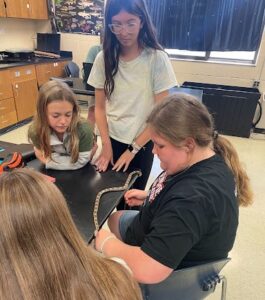
Animal Science Enrichment PC: PPS
Similar to the Peers of Westwood, Portland Middle School has seventh and eighth grade students who are partnered with students in the building and attend classes and events with them. Eighth-grade students also have the option to personalize their learning path by exploring a career working with youth. Those interested enroll in a course where they apply their learning at Oakwood Elementary School.
By collecting and analyzing academic and other data to determine how to personalize learning for students, middle school staff and administrators guide students into enrichment and intervention classes. This 30-minute daily block takes place right before or after lunch for each grade level. A variety of opportunities are available including Math Labs, Read 180, Forensic Science, Personal Finance, Drone Aviation, Animal Science, Robotics Team, Guitar, and more. Semester courses allow students to explore different interests throughout their middle school years. Entrance and exit criteria are used for Tier 2 intervention courses. Students may move in/out of interventions each quarter as staff compares the data to this criteria.
In addition to enrichment, PMS also offers elective courses. Project-based STEM (science, technology, engineering, math) electives teach engineering techniques and the design process. Students are challenged to be creative and innovative as they design projects such as pinball machines, towers, or a toy for a child with cerebral palsy. Eighth-grade students have the option to take an Applied Career Exploration (ACE) class as an elective. In this 2-hour block course, students explore 15-17 careers in skilled trades, health, veterinary science, and more. Each two-week unit contains a goal and/or project, with a capstone project at the end of the year. Other electives include band, music education, choir, computers, art, physical education, psychology, history through film, and game design.
High School
Jamie DeWitt’s experience in traditional, online, and blended learning is an asset to Portland High School (PHS) as they move to more personalized experiences for students and teachers. Joining PHS as principal in 2018, Jamie hopes joy will return to teaching and learning as teachers have permission to develop more relationships with students through course options and non-traditional scheduling. One of the first moves in this direction is to allow teachers to decide if they will give a final exam rather than having policy dictating the practice. By taking out the traditional exam schedule, teachers can explore alternative assessment options.
During the pandemic (2020-21), PHS ran an A/B block schedule to reduce the number of contacts students would have throughout the day. Both students and staff liked the pace and the time available to complete work. In 2021-22, Dewitt and her staff began researching that type of schedule in more depth. Staff were given roles of Dreamer, Researcher, Devil’s Advocate, and Orphan. They visited Belding High School who began a 4×4 block schedule after the pandemic, and DeWitt High School who has been using the schedule for 22 years. From the information gathered and many discussions, PHS began using a 4×4 block schedule for the 2022-23 school year.
One goal through this schedule change is to help students learn to advocate for themselves which will benefit them throughout their lives. With the 4×4 block schedule, students can finish a semester course in one quarter, allowing them more flexibility throughout the year. A personalized hour, called Plus 1 (+1), is scheduled for the last part of the day to allow students to explore careers, engage in work-based learning, get involved in community partnerships, or seek additional help to catch up if needed. These credit/no-credit experiences allow students to investigate career and personal interests without the fear of traditional grading consequences like GPA.
For students who do not leave campus in the afternoon for CTE courses or work-based learning experiences, +1 is an opportunity to stay on track to graduate or explore their interests through online elective courses. To set 9th-grade students up for high school success, a Freshmen Academy runs during this hour. Fifty students work with two teachers on organization, study and test taking skills, using technology safely and appropriately, and workplace skills. They learn the importance of attendance and GPA in high school, and hear from community experts throughout the year. Weekly class activities are designed to support the transition of the youngest learners in the building. These activities include, but are not limited to, grade checks, making a plan for the week, one-on-one and small group work with their teachers, completing assignments, and preparing for any work that needs to be completed over the weekend. Content is adjusted to personalize learning for each student as they need it. For example, one student may receive digital citizenship lessons while another visits the high school counselor. There is also a high level of contact with the Freshmen Academy parents to ensure that these students are successful in high school.
Plus 1 hour has been intentionally structured to provide additional opportunities for all students to receive increased academic support (Tier 1 or Tier 2) without impacting their graduation status. Because there are fewer students in the building due to CTE and work-based learning, most teachers have common planning time and are available for one-on-one student meetings. Students in grades 10-12 who are behind in credits spend the hour with a teacher in Raider Academy, and those who are not in Freshmen or Raider Academy work on site on virtual courses developed by PHS teachers or purchased through a vendor. Staff are available for assistance when needed.
Eleventh- and twelfth-grade students can take career-tech (CTE) courses through the Ionia County Career Center. Programs offered include Computer Programming, Construction Technology, Criminal Justice, Culinary Arts, Diesel Technology, Educational Careers, Health Occupations, Healthcare Foundations, Machine Tool, and Plant and Animal Science. AP courses in Biology, Calculus, Computer Science Principles, Government and Politics, Language and Composition, and US History, are offered at PHS. Students can take electives in core subjects, Information Technology, World Languages, Family Consumer Science, Fine Arts, and Health and Physical Education. The high school also offers online options for courses that are not available on campus or for students who prefer to learn at home.
Post Secondary Options in High School
PHS has a Student Services Team that helps students explore their after-high school options. Whether students want to go to college, serve in the military, start a career in the trades, or enter the workforce, this team provides the resources they need and guides them through the process to make their choice a reality. The team is made up of two counselors, a post secondary coordinator, an MRS transition coordinator, and a teacher with release time to focus on interventions for new early college students.
Post Secondary Coordinator, Jason Haid helps college bound students navigate dual enrollment or the Portland Early College Program (PECP). In the PECP, students can earn high school and college credit through a 5th year at no cost to families and may still participate in high school activities from 9th-12th grade. Students can earn up to an associates degree, 60 credits, or a Michigan Early Middle College Association (MEMCA) Technical Certificate. To obtain the certificate, students must complete 15 college credits with a 2.0 GPA or higher and have 100 hours of verified community service and/or college/career coursework. Students in the program receive extra support to ensure college success. During the Early College Mentorship hour (+1 hour), staff-to-student and student-student support is available for students taking their first college course and any other PECP student who wants or needs it. Enrollment into the program can begin as early as 9th grade. In 2021-22, 140 students were enrolled in the PECP with 14 completing an associates degree and seven earning a MEMCA certificate. Portland’s goal is to have 30 early college graduates each year beginning with the class of 2024.
Lansing Community College (LCC), where about 95% of courses are offered, is PHS’ major PECP partner. The Lansing Community College High School Advantage hybrid program is a virtual program where LCC professors visit PHS three times during the semester. When the partnership began, the three on-campus meetings (per course) were on Saturdays, but due to the increase in courses offered, some in-person class meetings now take place after school. Through LCC, students can earn a General Associates or Business General Associates degree. Those who plan to transfer from LCC to a four-year university can earn an Associates of Arts or Associates of Science Degree. Courses that are not offered by LCC or for students who are unable to attend the three in-person meetings, Portland partners with Montcalm Community College where the courses are 100% online. Beginning in 2022-23, Davenport University will offer 2-year business degree programs at the high school through the Portland Early College Program.
For students wanting to go into the trades or education, or enter the workforce after high school, Portland is connecting them to a work-based learning (WBL) experience. During Plus 1, students explore their career interests through Xello. Once they are matched with a WBL experience as close to that career as possible, they will attend every day during +1 hour. While career options and partners may be limited due to the small community, Jason continues to meet with businesses to find more opportunities for students. Students have been placed in credit unions, day cares, print shops, and UPS. One student’s 12th grade work experience extended into his 5th year. Upon graduation, UPS hired him while he attended Western Michigan University in aviation management. Portland is seeking to provide more WBL experiences like this.
Alternative and Non-Traditional Options
In the PACE – Alternative and Virtual Education program, Portland offers adult, alternative, and virtual education options. The programs are open to all Portland Public School students, Portland residents, Ionia County residents, and the residents of the five counties contiguous to Ionia. Tony Deardorff has been instrumental in growing the alternative and virtual programs at Portland. He started as an alternative teacher for PACE after receiving his teaching degree and became the principal in 2014. In 2022, 37 students graduated from Portland’s alternative and virtual programs.
The alternative high school enrolls 40-60 students per year. This program is classroom based with Odysseyware online classes for PE, Health, and some elective courses. Students come to campus every day and work with the long-term staff who understand best practices for teaching in this environment. In addition to online electives, students may take art and ceramics in the building and have the option to attend two night classes per week.
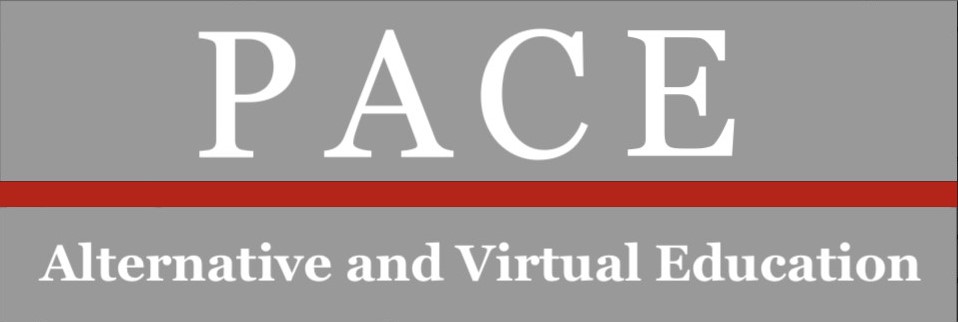
Approximately 50 students each year choose to enroll in Portland’s self-paced virtual school. Odysseyware and Michigan Virtual course content is taught by Portland’s online teachers and students are supported by the district mentors. While there is not a drop in lab, students have the opportunity to come in for night classes or meet with the teacher after a night class.
Portland’s homeschool partnership meets the needs of families who want teacher support as they educate their children at home. Approximately a dozen students enroll with Portland to take online classes, dual enrolled courses, and participate in robotics.
Adults can earn their high school diploma at night through courses taken in the PACE building. Some attend to improve their reading and writing, English, and math skills in this program.
Portland Public Schools focuses on the needs of their students, families, and community when making district, building, and classroom decisions. They have developed systems and processes to guide teaching and learning and put Capturing Kids Hearts at the center of their culture, resulting in deeper student engagement and higher academic achievement. The district is increasing options for personalizing learning on and off campus, and continues to pursue growth for all stakeholders.
Author: Lisa Sitkins, President and CEO, LSS Connections and Consulting LLC, October 2022
